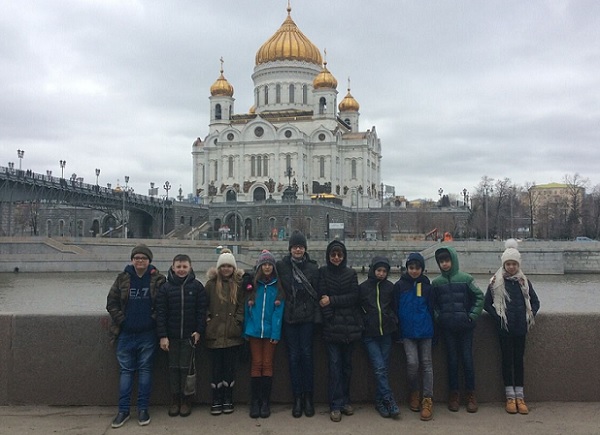 Kalinka Russian school visit to Moscow;
Credit: Kalinka/Novye Veshki
Kalinka Russian school visit to Moscow;
Credit: Kalinka/Novye Veshki
The Kalinka Russian school in Luxembourg has been contributing to the Nation Branding of Luxembourg by an immersion trip to Russia.
Luxembourg's branding involves many actors with an international profile in an operation to promote the country, such as foreign residents or cross-border commuters.
Meanwhile, there are also language communities among Luxembourg nationals that are eager to contribute to this effort. So is the Luxembourgish Kalinka Russian School, a leading Russian school in the Grand Duchy that promotes the Russian language and Russian culture in Luxembourg, and also promotes the Grand Duchy as it reaches out to a large public in many countries through participation in numerous international conferences, competitions, cultural and educational projects. The audiences often get the first acquaintance with Luxembourg, and they discover the country from positive points of view.
Numerous cultural activities and events that the Russian School in Luxembourg realises with the financial support of its main sponsor, the Luxembourgish East-West United Bank, allow for an exchange of experience in different fields, especially in education. The best example of this is a new programme of language and cultural exchange launched by Kalinka and the Novye Veshki International Gymnasium in Moscow. From 2 to 9 April, seven Luxembourg students aged 11 to 12 years and studying Russian, visited Moscow by immersion as the best way to learn a foreign language.
As a non-official goodwill ambassador for Luxembourg, Kalinka's delegation made a presentation of Luxembourg in Moscow, including its educational system, rich historical heritage, modern technology-based and innovation-based economy, as well as its multicultural society, welcoming about 170 nationalities, and its know-how in integration with tolerance to the native language and traditions of newcomers.
An invaluable value of Luxembourg is multilingualism. The best way to show a multilingual Luxembourg was the presentation of all the young Luxembourg guests by themselves in all the languages they spoke. It made a lasting impression on the public and, together with all the new facts learnt about the Grand Duchy, inspired much enthusiasm to visit the country to the residents of the cottage settlement of Novye Veshki, a unique closed elite cottage settlement, 2 km from the Moscow Ring Road, an ecologically clean and safe space. The Novye Veshki International Gymnasium was established specifically for this "city" and has approximately 200 students.
The young Luxembourgers were accommodated with host families, attending classes and clubs according to the daily gymnasium schedule, doing lots of sightseeing and visiting museums to experience a new culture, while making new friends. A unique experience was the visit to the SOS Villages d'Enfants in Tomilino that accommodates more than 60 orphan children in 11 family houses with mothers and fathers. The Luxembourgers also recalled the Russian Club of Luxembourg's annual charity balls, with the proceeds directed to the charitable foundation SOS Villages d'Enfants Monde in Luxembourg, a member of a worldwide organisation.
Many of the young Luxembourgers were surprised by the openness and kindness of their Moscow peers, as well as by a warm and friendly atmosphere in the Gymnasium. For example, they said that girls had friendships with boys, that students in Novye Veshki were very inquisitive and attentive, striving for knowledge and achieving the highest grade in many subjects. Therefore, the guests from the Grand Duchy were devoting as much time as possible to their new friends. They hope now to talk about this experience in Luxembourg schools.
The educational process was also very different from the experience that the children had in the Grand Duchy. Classes start at 09:00 and finish at 18:00 daily, with many breaks of 15-20 minutes. There are four meals a day in the school canteen and a special rest areas with bean bag chairs and inflatable mattresses to have a rest or a sleep during the school day. The lessons seemed very interesting. The study programme provides a high-level education in the exact and natural sciences. For example, the Gymnasium holds joint lessons in physics and music, offers workshops on robotics, organises scientific conferences for students who prepare their reports. In a joint lesson of physics and music, the Luxembourger students were using special tubes to play different musical notes. The goal of the lesson was to develop a sense of rhythm, as well as creative thinking, as any physical object can be used as a musical instrument. Such activities show kids interconnected phenomena, do not let them get bored, and turn learning into a creative process. This approach distinguishes the Gymnasium from many other schools in Russia or abroad.
The Novye Veshki International Gymnasium has partnership with many foreign universities and schools and constantly participates in international cooperation, so the staff is always available to share unique successful practices and methodological findings and is considering doing this in Luxembourg. The Kalinka Russian School and the Novye Veshki International Gymnasium are going to continue their partnership in Luxembourg. The parties are working out comfortable and flexible formats for studies, rest and experience exchange. They hope very much that the nascent project of language and cultural exchange will last for many years and will be interesting and diverse.








